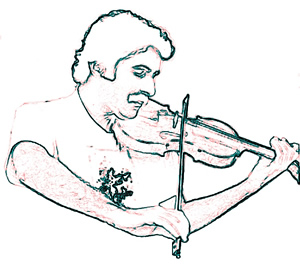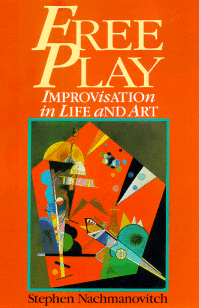
Home
Articles
Reviews
Hot Links
About Us
|
Improvisation as a Tool for Investigating Reality
by Stephen Nachmanovitch |
|
|
Improvisation is a tool for investigating reality. What is the reality we are investigating? Let me approach that question sideways through a couple of stories. When I was writing Free Play, I was visiting a dear friend of mine, Michael Stulbarg, who was a pulmonologist in San Francisco, what we used to call a left-brain person, very logical and scientific. I asked him, as a doctor, what does improvisation and creativity mean to you? Without hesitation, he said, it means actually seeing the patient who's in front of you, rather than a textbook case or a diagnosis you've been taught. Any doctor , who is in practice, and who really practices their practice, knows that each person is absolutely individual and cannot be completely categorized except in terms of their own situation. To see clearly that uniqueness,
to see another human being, is a remarkable thing. And that
ability is at the core of improvisation. Many people have the idea
that improvisation means acting wild and crazy or behaving without
pattern or procedure. They tend to associate improvisation with
randomness. Of course everyone knows it's the opposite. Improvisation is similar in my mind to the 19th Century scientific practice of natural history which was Gregory Bateson's home territory. In natural history, you aren't compounding a carefully controlled situation as in experimental science or fully scored music, you're looking at what you find in nature, and trying to deal with it, and react to it, and understand it. In natural history one approaches a complex system whose multifarious interactions are impossible to specify in advance, coming to that encounter with no fixed expectations, but with a disciplined capacity to observe and react, a capacity which has been honed by experience. I often play with partners in chamber improvisation. A friend of mine who runs a children's theater in Charlottesville came to one of our concerts. In our concerts, there's no discussion, no planning of any kind before we go on stage--other than preparing the equipment, tuning up, and the agreement to listen to each other completely and produce out of that a coherent and coordinated music. My friend sayd that as she was watching us on stage, that she never had seen adults listen to each other so intently. Out of the pure and complete act of listening and nothing else, you can produce coordinated, organized music; which is nevertheless from that time and place and from that moment. I teach at chamber music festivals where people normally come together to play Mozart, Shostakovich, and so forth. We do improv workshops where groups, usually quartets, concertize together, after perhaps three days of rehearsal. One of the things that's remarkable in these people's experience -- people who are classically trained, who have had that lifetime experience of having the music stand as a barrier between them and the audience, between them and their fellow players -- is the power that they experience of being there with and audience with nothing in between. I'm speaking not just of a music stand as a physical barrier, but also the virtual music stand of a memorized score. To have nothing at all between you and your fellow players, you and your audience, is such a remarkable experience. From that experience of encountering each other, comes all of what I'm calling the natural history data of music. All that observation, all that feeling, all of the millions of nerve impulses that come in and out every second as you encounter other people, as you encounter a situation, as I encountered a few minutes ago when I was playing here. At one of these chamber music workshops, the faculty would evaluate the participants' playing, not for the purpose of giving them grades, but for the purpose of placing them next year with compatible people and playable scores. The people with the more basic skills would be given Mozart and Haydn, and the people with more developed skills would get the Brahms and the early 20th Century material, and the most advanced skills would be given the brand new contemporary scores, which are often complex looking, difficult to follow, and require a lot of experience to play. There was one fellow who was a fantastic improviser. He was a violinist with excellent control of his instrument, he could make all kinds of weird, whispery, wonderful 21st century sounds, microtonal, sliding, jumping and bouncing, doing all the wonderful things that you can do with a violin. He was minutely responsive to his partners. I thought he was fantastic. Then to my great surprise, we go to the faculty meeting, and all the other faculty members gave this guy what you might call a C grade, saying he was only advanced enough to play Haydn and Mozart, because what they were looking at were his reading skills. And indeed, his reading skills were at that level. What I got to experience through his improvisations were his musical skills, which is a whole different ball of wax. It's so fascinating to be able to encounter real musicianship, real skill. We've all met people who are naive musicians, not well trained, that can get incredible sounds out of instruments, out of their voices. Where do we place that on a scale of musicianship? The other day I was in the grocery store and ran into a little girl I know, Vlera, who is two years old. Her parents are from Kosovo, so she's half an English-speaking environment and half in an Albanian-speaking environment. When she talks to strangers, she can only say one word, which is "Nah." We had the most wonderful conversation in "Nah": Nahhh in innumerable tones and timings and colors of expression, Nah! Na? Na.....h passed back and forth between the two of us for many minutes. I realized that with a one-word vocabulary, naaaaah, you can come up with an infinite variety of expression. And she could do it because she was completely uninhibitedly wired into her nervous system and to her surroundings and her feelings of shyness and fear and boldness and playfulness and flight and fight. All these expressions and moods and explorations of relationship were swirling around inside that single syllable which we tossed back and forth to each other. I sometimes teach a workshop
called "Gibberish, the Universal Language." When I work with
chamber musicians, we often spend the first hour doing gibberish
pieces--put the instrument down, put your years of training and skill
away, and lets just make noise together and learn to listen to each
other completely. Listening is everything. Pauline Oliveros,
for decades, has been talking about deep listening as the essence
of the work that we do. Now in classical music, you're not allowed to laugh during the performance, so that doesn't happen. If laughing were allowed, then classical musicians would be funnier too. The interesting thing that I've discovered when I had actors working in gibberish, rather than words, they could still be funny, but in addition they suddenly had a huge range of other and more serious emotions available to them. It is quite a strange thing, but they would do these pieces with three or four words like chuchki and jajamene, and slap their body parts, and bang the floor, and they were able to get into very profound riffs: you can never say what it's about in a literal sense, but primal pieces about life and death and love and loss and basic human relationships and tragedy and all kinds of things that improv actors usually don't ccover in their work. Somehow nonsense and gibberish gives them permission to do that. Because it is so unlabeled , they are able to go anywhere with it. Language labels things for us. Jean Piaget wrote: "Intelligence organizes the world by organizing itself." The problem with language is that it turns the world into things. Because of the incredible convenience of language, we hypnotize ourselves into believing the reality of linguistic symbols, especially nouns. Gregory Bateson, following the inspiration of Anatol Holt, used to say that he wanted to get a bumper sticker that would say, "Stamp out Nouns."Nouns, representing so-called persons, places, things, and ideas, are a marvelous convenience to allow us to get up and to move our mouth parts at each other and communicate, but they don't represent anything except for a very provisional and temporary kind of reality.
These musical instruments: they are made of wood, the wood came from forests, and the forests came from particular ecological conditions, from the rain, from the earth. The characteristics of the wood are related to who cut the wood down, and in what way and how it was cured before it was made into an instrument. And eventually in the fullness of time, these instruments will turn into debris of some sort. In Buddhism, they call this the "emptiness of inherent existence." When Westerners hear that term, "emptiness," they ten to get alarmed, because they think that emptiness means nihilism, as if things don't exist. The operative word in that phrase is "inherent." Look at this red guitar cable connecting my red violin to the amplifier in the podium over there: like the violin, it was made by peopl; the plastic and metal and materials came from some place; the whole history of consciousness of all the people whose inventiveness and whose labor that went into making a guitar cord is here! So, we're looking at an immense complex of interrelated activity, which is only temporarily present in the form of that "thing." Obviously, if I step over that cable in the wrong way, I can trip over it-it is eminently real- emptiness is not the same thing as nihilism. Thich Nhat Hanh substitutes for the word emptiness, a word which is more precisely communicative: inter-being. The wood of the instrument, the trees, the people who made it, the people who cultivated the trees, the people who work in the factories who made the strings and everything else, all of those inter-are with the violin. There is a wonderful third century text from China called Hsi K'ang's Poetical Essay on the Lute. It is an essay about how to play the ch'in, the Chinese lute. He spends about half of his text about tree cultivation and ecology and what goes on in the forest and how you choose the trees and that sort of thing. For him, the proper study of a musician is ecology. The ecology of the forest, but also the social ecology, the intellectual ecology. When your instrument is not built and if you're doing a free improvisation, there are tunes that are rattling around in your head from the commercial you heard on the radio this mornng, or some piece of music that you've always loved, or some type of ethnic feeling that's very present in your life, all of those things coexist with the present moment of your real time artistic creation, and they are available for you to draw upon. Emptiness means emptiness of inherent existence. The guitar cord or or the improvisation doesn't exist by itself, but it coexists, it inter-is, with absolutely everything in the universe. And because "absolutely everything in the universe' is information, that is why you can get up with nothing up your sleeves, and no plans and no stated intentions and improvise music with each other, because you have an infinite amount of information to draw upon that's already present and already with you, from the four and a half billion years of organic evolution of your own body to the evolution of all of our cultures, and all of our friend's cultures and everything that we have come in contact with. So if we go back to our initial question of improvisation as a tool for investigating reality and ask what is the reality that is being investigated, that reality is inter-being. Inter-being, then, is the opposite of thing-ness. Some of you have probably read the work of Christopher Small, who does this wonderful deconstruction of the concert hall environment. H plays with the whole notion of how all these works have become works. How the process of the composer's mind and the process of the playing of the instrument and the process of its reception of the audience have turned these things into works a s if they were solid objects, and then the history of art or of music is the study of those objects as though they had thingness. All of us can sit in a concert hall and love hearing Beethoven, and we can also sit in a concert hall and just imagine if Beethoven himself walked into the sanctimonious atmosphere and saw the kind of straitjacket that he'd been placed in. He was a man who was prone to have temper tantrums so you can imagine what he would have said. It wouldn't be quite as bad as what Jesus might say if he could come back and see what's being said and done in his name, but it would have still been pretty bad! Here is another entry point into the reality which we investigate with improv. I recently met an extraordinary man named Colin Lee. He is a music therapist in Toronto, originally from England. He has written a book called Music at the Edge. It's the chronicle of his music therapy journey with an AIDS patient who was also a skilled pianist. I haven't had too much to do with the world of music therapy and frankly haven't known that much about it. My wife, a hospice and palliative care doctor, once described to me a couple of people who come to the hospice units and play the harp for the patients. It sounds a little horrifying to me; if I was dying, do I really want harp music with all the cultural connotations that has in Western civilization? But then I encountered the work of Colin Lee, and I found out what music therapy is about. What he does is improvisation with patients. He was mostly working in hospice/palliative care with lots of AIDS and cancer patients. He was working with people who were in states of great terror-knowing that they were going to die soon. He would improvise together with them. He had some patients who could play musical instruments and others that couldn't and they banged on drums, thumpers, and shakers and percussion instruments, the piano keyboard. He improvised with them, allowing the music to reflect incredible pain, anxiety, peacefulness, or reconciliation. The whole gamut of extreme emotions were made available through this musical conversation which could take place at a speed and with an articulateness that no one could have with a verbal therapist, because language is simply too slow and clumsy. The amount of information that gets passed back and forth in each second of music is simply beyond what ordinary language can do. For this reason, we can use music as a tool to investigate the emotional reality of people in the greatest distress. That reality, even though it's hard to talk about, is something that you come face to face with, quite intimately through hearing the sounds the patient plays. Since many of the patients look very bad, or very odd, if we were presented with video recordings we would be affected by the visual appearances and not listen as clearly to the emotional content that is being expressed. When we have the audio-only content of a CD, we have the opportunity to get much more intimate with the patients' feelings. Colin played me a tape of an improv that he did with a seven year old Down's Syndrome boy who had never spoken an articulate word, and at the end of the session of playing the piano with Colin, said, "Bye." Some of the people in these situations look funny, look bad - if you see them you get a certain impression ofwho they are, but if you hear the sound they make, theyn you get a very different impression. You are going directly into a relationship with them, and experiencing their thoughts and their emotions in real time. What's magical is that all improvisers can participate in this kind of work. There are so many styles and ways of doing things, in every single one of the many styles is an immediacy and complexity of real time improvisation, real time information that's transported by sound waves, that cannot come any other way. There is a South African word, Ubuntu, which is the same thing as inter-being. Desmond Tutu brought it into currency in the West and it is the opposite of Descartes. Descartes is famous amongst other things for saying, "I think, therefore I am." Ubuntu means "I have my being through your having your being. Ubuntu is the territory that we get into as we do our improvisational explorations. excerpt from
Keynote Address -- International Society for Improvised Music
|


 Stephen Nachmanovitch is the author of
FREE PLAY,
Stephen Nachmanovitch is the author of
FREE PLAY,